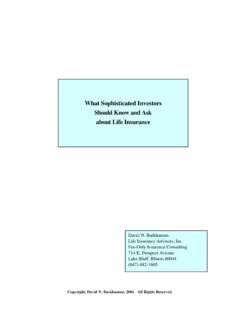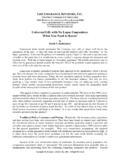Transcription of Buy-Sell Agreements: Why and How to Fund Them
1 Buy-Sell Agreements: why and how to Fund Them David N. Barkhausen life insurance Advisors, Inc. Fee-Only insurance Consulting 714 E. Prospect Avenue Lake Bluff, Illinois 60044. (847) 482-1605. Copyright, life insurance Advisors, Inc., 2002. All Rights Reserved. Buy-Sell Agreements: why and how to Fund Them Table of Contents Page Whether and When to Implement a Buy-Sell agreement 5. Reasons for Buy-Sell Agreements 5. Reasons to Fund Buy-Sell Agreements 7. Permanent life insurance to Fund Lifetime Buyouts 8. Installment Payments vs. life insurance as a Funding Source 8. Questions about Possible Inequities in insurance Funding 10.
2 Types of Buy-Sell Agreements and insurance Policy Ownership 11. Reasons for a Redemption agreement 12. Reasons to Favor a Cross-purchase agreement 15. Avoiding the Corporate Alternative Minimum Tax 15. Increasing the Cost Basis for Surviving Shareholders 16. Avoiding Dividend Treatment of a Redemption 17. The Disposition of Policies No Longer Needed to Fund the agreement 19. Additional life insurance Funding Issues 21. The Pros and Cons of First-to-Die Policies 21. Permanent vs. Term insurance for Buy-Sell Funding 21. Distinguishing the Need for Key Person insurance from Buy-Sell Coverage 22. The Funding Needs of ESOPs 22. The Funding Needs of Public Companies with Lightly Traded Stock 23.
3 Funding Disability-related Buyouts 23. Conclusion 24. 2. Buy-Sell Agreements: why and how to Fund Them Executive Summary Once a closely-held business attains a meaningful value, its owners should implement a Buy-Sell agreement to assure a market for a partial interest in it and to provide a smooth transition to its future owners. Without adequate and regular funding -- with life and disability insurance funding wherever possible -- the purchase obligations of a Buy-Sell agreement are often empty and unenforceable. The funding of the agreement is more important than identifying the future buyer with certainty. With a wait-and-see Buy-Sell agreement , life and disability insurance can be purchased on the owner who will be expected to sell , and the buyer can be determined later.
4 Without funding, however, it may not be possible to control this decision. Ownership of the insurance policies funding the Buy-Sell agreement should be structured to minimize taxation. Issues to plan for or around include: The possible imposition of the corporate alternative minimum tax on the insurance proceeds received by a C corporation;. Increasing the capital gains tax cost basis for the surviving owners by the amount of the insurance proceeds;. Structuring any C corporation stock redemption to assure, if possible, its treatment as a sale of a capital interest rather than the distribution of a dividend;. Avoiding extra taxes on excess accumulations of retained earnings by a C corporation that are not justified by reasonable business needs.
5 Arranging any changes in the ownership of policies to avoid transfers-for-value that subject otherwise tax-free insurance proceeds to income taxation; and Considering the eventual ownership and use of the insurance policies so as to reduce both income and estate taxes. Disability Buy-Sell provisions relating to the eligibility and timing of payments for a disability- related buyout should follow the language of the insurance policies funding them. Because it is not possible to insure the full amount of the purchase required upon disability, payments from other sources -- including the cash value of life insurance policies and life insurance premiums saved by life insurance policy provisions waiving premiums upon disability -- should be identified.
6 3. life insurance ADVISORS, INC. FEE -ONLY insurance CONSULTING. 714 E. PROSPECT AVENUE LAKE B LUFF, ILLINOIS 60044. PHONE (847) 482-1605 FAX (847) 234-9973. Buy-Sell Agreements: why and how to Fund Them by David N. Barkhausen Buy-Sell agreements among co-owners or present and future owners of a closely-held business are intended to assure the smooth future transition of its ownership. They provide the mechanism, and, if properly funded, the means, to effect a change in control and a transfer of interests upon the occurrence of a number of events, beginning with death, disability and retirement. Yet, for some reason, there is widespread confusion among professional advisors on the questions of whether and how to fund these agreements, even though, without such funding, they may contain little more than empty, unenforceable promises.
7 Consequently, most existing agreements need much improvement. This is not intended as a comprehensive treatise on all aspects of Buy-Sell agreements. Rather, it focuses on their insurance funding, first outlining the compelling reasons for doing so and then reviewing in some detail the tax and non-tax consequences of placing the insurance policy ownership with the individual co-owners (a cross-purchase plan), with the business (a redemption or entity arrangement), or in a hybrid form. Whether and When to Implement a Buy-Sell agreement : There is a surprising lack of recognition of the circumstances calling for a Buy-Sell agreement .
8 They are not limited to the classic case of two co-owners, each owning half of a successful, mature business. They should also be considered: (1) Where a company with little or no value can expect to appreciate in the near future. (2) Where a majority, and perhaps older, owner ought to provide an incentive, in the form of helping to fund a Buy-Sell agreement , for one or more younger owners and key employees to stay with the business. (3) Where a sole owner wants to assure the future market for a business by identifying a buyer in advance from among the following: children, key employees, competitors, suppliers, or customers. (4) Where it is unclear whether one or more children will or should be future owners, but having insurance in a trust for their benefit enables such children and the trustee to make this choice at the proper time in the future.
9 Reasons for Buy-Sell Agreements: Before addressing the question of funding, it may be worthwhile to review some of the major reasons for a Buy-Sell agreement in the first place: 4. (1) To provide a market for the business interest of a deceased, disabled, or retired owner. Closely-held enterprises do not have a ready exchange for their sale, especially of partial interests in them. In most cases, only co-owners, those already in the business, or the business itself would want to or be in a position to buy them. Note that this market-creating purpose for a Buy-Sell agreement may be especially important for a sole proprietorship, the sale of which might be arranged to a similar business or to one or more key employees who are not currently owners.
10 (2) To restrict transferability, both during life and at death, of ownership interests by defining and limiting those who may acquire or receive them. Regardless of who might be willing to buy into the business, the existing owners are logically interested in keeping ownership amongst themselves or others already involved in the business. More than likely, they do not want to go into business with the surviving spouse or children of a co-owner, or even, for any length of time, with the executor of a co-owner's estate. Nor, in the absence of an agreement to the contrary, do they likely relish the idea of bringing in any outside investors, even assuming they could attract them.







